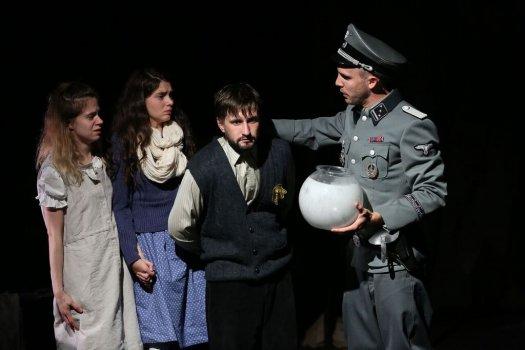Terezin
Although grim and unremittingly depressing, this play makes an honest stab at dramatizing life in a concentration camp.

Michael Leigh Cook, Natasa Petrovic and Sophia Davey in a scene from “Terezin” (Photo credit: Carol Rosegg)
[avatar user=”Joel Benjamin” size=”96″ align=”left” ] Joel Benjamin, Critic[/avatar]Can any playwright, no matter how talented, adequately dramatize the agony of millions of innocent victims of the Holocaust, or, for that matter, any of history’s holocausts that have been visited upon entire populations with mind-boggling frequency?
I don’t think so, but the grim, unremittingly depressing Terezin, written and directed by Nicholas Tolkien (the Jewish great-grandson of J.R.R. Tolkien) makes an honest, if ultimately unsuccessful, stab at it.
Terezin has many problems: it is dramatically awkward with its overdrawn characters and historically questionable in some aspects, but, even with its faults, pulls no punches and certainly might be a way of illuminating this grotesque period for those who are for some reason unfamiliar with it.
(At the performances under review, the Peter Jay Sharp Theater was, indeed, filled with many teachers visiting NYC to research the Holocaust.)
Terezin, of course, was one of the Nazi concentration camps, this one located in German-occupied Czechoslovakia, where Jews and other “enemies of the Reich” were taken, first for isolation and, finally, for extermination.

Sasha K. Gordon, Natasa Petrovic, Sam Gibbs and Blake Lewis in a scene from “Terezin” (Photo credit: Carol Rosegg)
Loaded with many characters and incidents, Terezin focuses on two sisters, Alexi (Natasa Petrovic) and Violet (Sasha K. Gordon) who, along with their father, Kurt (Sam Gibbs, playing his complex palette of emotions quite well) and mother, violinist Isabella (Sophia Davey, a calm presence who returns frequently as a spirit) are savagely grabbed by the SS for deportation to Terezin. (One of the shocking first events is the rather realistic strangulation of one of the characters followed soon by the usual vile language—“Jewish swine,” etc.—used by the clichéd glowering Nazis.)
At Terezin, they are witness to indignities, starvation and torture. They are forced into a sadistic charade to convince the Danish Red Cross that Terezin is a spa for “important Jews” and are always under the threat of being deported “further east” to Auschwitz where their lives would mean even less.
Tolkien populates his play with the usual, brutal Nazis: Karl Rahm, the camp commandant (Michael Leigh Cook) who had a warm spot for Isabella; Stefan (Charlie Manoukian), Rahm’s extremely willing assistant; and Udo, a particularly sadistic SS Platoon Leader (Blake Lewis).
There is also Eric (Skyler Gallun, youthful and believable), an architect and Rahm’s adopted son who is enlisted to design and build the phony feel-good spa to confuse the outer world. Eric becomes the hero of the play, appearing to be the only German with a conscience. But, is he really Aryan?
Tolkien tries to humanize some of the characters in awkward ways. Rahm, it seems is a music lover and wants to learn to play, forcing Alexi to teach him. Even evil Udo is shown to have a feeling or two, which dissipate quickly.
Tolkien portrays a liberating Russian soldier as softhearted and kind to the children, which history has proven as unlikely. The Russians were notoriously violent and unforgiving as they pushed the Nazis back.
A sentimentally hopeful ending, involving a butterfly was heavy handed and phony.

Sasha K. Gordon and Peter Angelinas in a scene from “Terezin” (Photo credit: Carol Rosegg)
Anna Driftmier’s solemn set of distorted pipes, bent into shapes resembling ruins and a large curtain that encircles the stage several times, helps set the mood, as does Marie Clare Brush’s ragged costumes for the prisoners and crisp military gear for the officers. Amanda Szabo’s lighting and projection designs are superb.
Charlotte Bydwell provided some very basic choreography for dream sequences, but imbued them with just the right folksy quality.
All the acting was fine, although the German characters came across as a tad too gleeful. Ms. Gordon’s constant shrieking is a bad choice for someone hiding from the bad guys, but she and Ms. Petrovic were otherwise sympathetic.
Tolkien directed his play with a heavy touch bringing out the melodramatic elements of the play, sometimes making it difficult to watch.
Perhaps only actual documentaries with historical films and first-person witness testimony can convey the truth.
Terezin (through July 2, 2017)
Peter Jay Sharp Theater, 416 West 42nd Street, in Manhattan
For tickets, call 212-279-4200 or visit http://www.TicketCentral.com
For more information, visit http://www.TerezinThePlay.com
Running time: two hours and 30 minutes including one intermission






Leave a comment